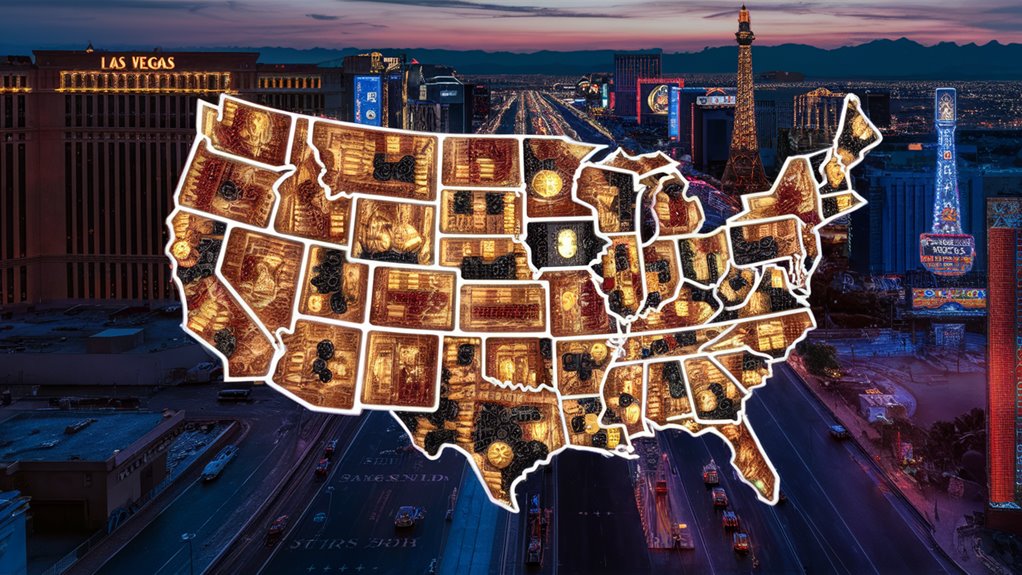
What to Know About Gambling Regulations in the US
Getting to Know US Gambling Rules: An Easy Guide

Federal, State, and Tribal Levels
The gambling rules in the United States involve a tough system that includes federal, state, and tribal control. Each level has its own role and powers, making a mixed set up for gaming laws.
Federal Gaming Rules
Major federal laws form the gambling scene: 이 내용을 꼭 확인해보세요
- The Wire Act stops sports betting across states
- The UIGEA sets rules on online game money moves
- The Indian Gaming Act controls tribal casino work
State Rules on Gaming
State gambling rules change a lot in different places:
- Nevada has the loosest gaming rules
- Utah does not allow gambling at all
- Most states have their own set of limits
Tribal Gaming Work
Native American gaming has special rules:
- Tribal groups can set up casinos with state deals
- They must follow both tribal and state laws
- These casinos help grow tribal money
The Growth of Sports Betting
After the fall of PASPA in 2018, sports betting changed:
- More than 30 states now allow sports bets
- Online betting sites must follow strict rules
- Phone betting keeps growing fast
Rules of Online Gaming
Online gambling laws now include:
- Checks on player age
- Location tech needs
- Safe gaming steps
- Limits on inter-state gaming
- Rules against money laundering
US Federal Gambling Rules: Major Points
Important Federal Laws on Gaming
The United States has a tough set of federal gambling laws that go with state laws. This law draws lines for game actions across the country while giving states lots of control.
Big Federal Gaming Laws
The Wire Act
The Wire Act of 1961 stops sports bet info from crossing state lines, a key part of federal gambling control.
Law Against Web Gambling
The UIGEA of 2006 puts hard rules on online game money moves, changing the web gaming scene a lot.
Indian Gaming Law
The Indian Gaming Act of 1988 sets up the rules for tribal gaming work, making tribes make deals with states for casino-style games.
Sports Bet Rules
The old Sports and Pros Act (PASPA) used to limit sports bets everywhere until 2018, when it was struck down, starting state-run sports betting.
Money Rules
Money Rules in Gaming
The Banking Secrets Act puts heavy report needs on gaming places, making a strong money check system in the gambling world.
Ruling Together
These federal gambling laws make a multi-layer setup that goes with state gaming rules, watching over gambling in the United States strongly.
State Rules, Place by Place
Guide to Gaming Rules in Each State
Top Gaming Places
Nevada and New Jersey are the easiest places for gaming, with Las Vegas and Atlantic City as top spots. On the other hand, Utah and Hawaii stop all gambling.
State Controls on Gaming
Most places have their own set of limits. Tribal gaming jobs work under the Indian Gaming Act, making tribes set state deals. Forward places like Pennsylvania and Michigan are getting into both land and web betting, while others keep tough limits on where and how you can bet.
Key Control Points
Age and License Needs
State gaming rules set important work rules:
- Lowest age to bet (often 21, some 18+ for lottery/bingo)
- Ways to get a license to run games
- How much tax to pay and how it’s shared
Different Rules in Places
Gaming rules change a lot in states on:
- What games you can bet on
- Max bet limits
- Hours you can play
- Where you can play
- If you can play online
Web Gambling Laws
Web Gambling Laws in the US

Federal View on Web Rules
The rules for web gambling in the US changed a lot since 2011, from a full no to a detailed multi-level system. This setup involves federal watching, state-specific rules, and tribal deals.
Foundation of Federal Laws
The Wire Act of 1961 watches over sports bets across states, while the UIGEA goes on to control online bet money moves. A big 2011 rule change made ways for states to start legal online poker and casino games inside their borders.
State Rules
New Jersey, Pennsylvania, and Michigan lead with strong web gaming set-ups that have:
- Detailed license systems
- Ways to keep customers safe
- Needs to check where you are
- Checks on your age
- Plans to stop too much gambling
- Safe money moves
Betting Across States
Gaming deals across states let regulated online poker work across states taking part, keeping tight control while letting states work together. Places must get different licenses for each state, making sure they follow local rules and keep their operations clean.
Sports Betting After the Big Court Decision
Sports Betting Growth After the Big Change
The Big Court Change
The 2018 Court change that ended the Sports and Pros Act (PASPA) really changed sports betting in the US. This big move stopped the old limits on sports bets, letting states set up their own legal sports betting rules.
State Moves to Let Sports Bets
More than 30 states have made sports betting laws since the change, making a mixed set of rules all over the country. Each place has its own way with:
- Licensing needs
- Tax setups
- How to run bets
- Types of betting (shops vs. online)
Big Names and Money Made
New Jersey and Pennsylvania are big in the new betting world, showing how much money can be made from controlled sports betting. These states have both shop sportsbooks and web betting, making lots of tax money from their detailed betting setups.
Rules and Tech in Betting
New sports betting jobs must follow strict rules on:
- Checking how old you are
- Location tech needs
- Safe betting plans
- Data safety steps
Working with Tribal Gaming
Native American gaming groups are more and more in the sports betting game through state-tribal deals. These deals help them reach more markets while respecting their own rights and past deals.
Betting Market Keeps Growing
The sports betting scene keeps getting bigger as more states look at new laws. Places change to new tech and what customers want, making new ways to bet both in shops and online.
Tribal Gaming Rights
Knowing Tribal Gaming Rights and Rules
Power to Rule Gaming
Native tribes have their own power over betting work on their lands through big laws like the Indian Gaming Act (IGRA) of 1988. This big federal law made a detailed setup for tribal gaming work, needing tribes to make deals with states for casino-style games.
Types of Tribal Gaming Work
Class I Gaming
Old tribal games are in Class I, under only tribal control.
Class II Gaming
Bingo and other simple games are in Class II, watched by both tribes and the National Indian Gaming Group (NIGC).
Class III Gaming
Big casino games, slots, and sports betting are in Class III, needing clear state-tribal deals and federal watching to work by law.
How to Use Gaming Money
Money from tribal gaming must go to certain places:
- Tribal government work
- Plans for tribal good The Rise of Mobile Sports Betting in 2025
- Money-making plans
- Charity groups
- Local government help
Money Impact
Tribal gaming businesses are big money makers, bringing in lots of cash that helps pay for key services and building work in tribal places. These jobs have turned into multi-billion dollar work, giving key cash for tribal growth and being able to stand on their own.

